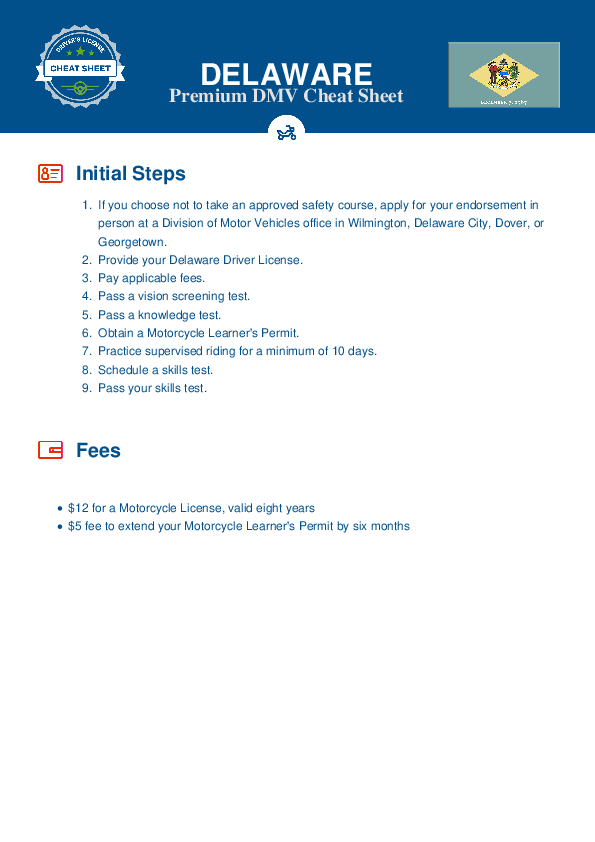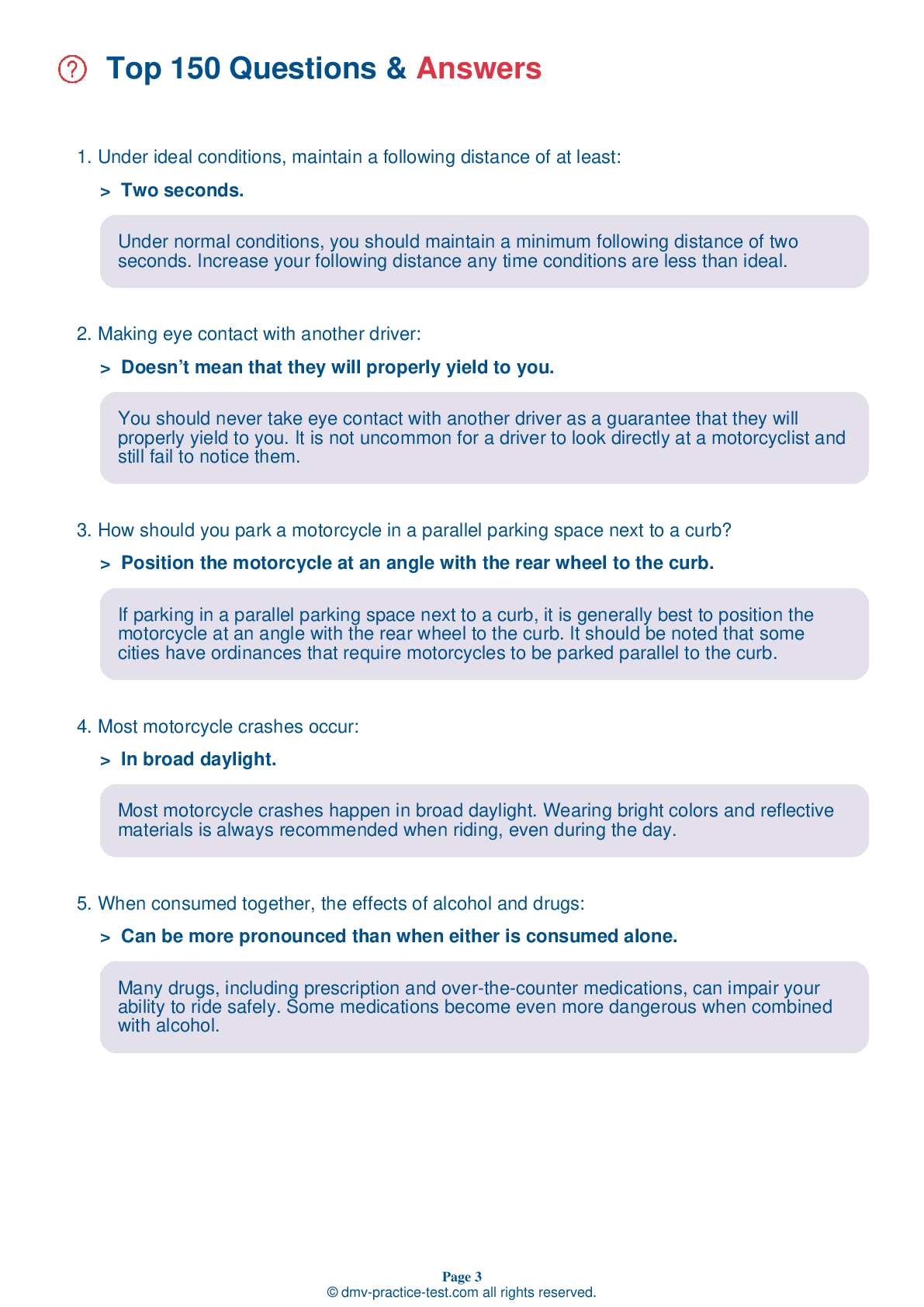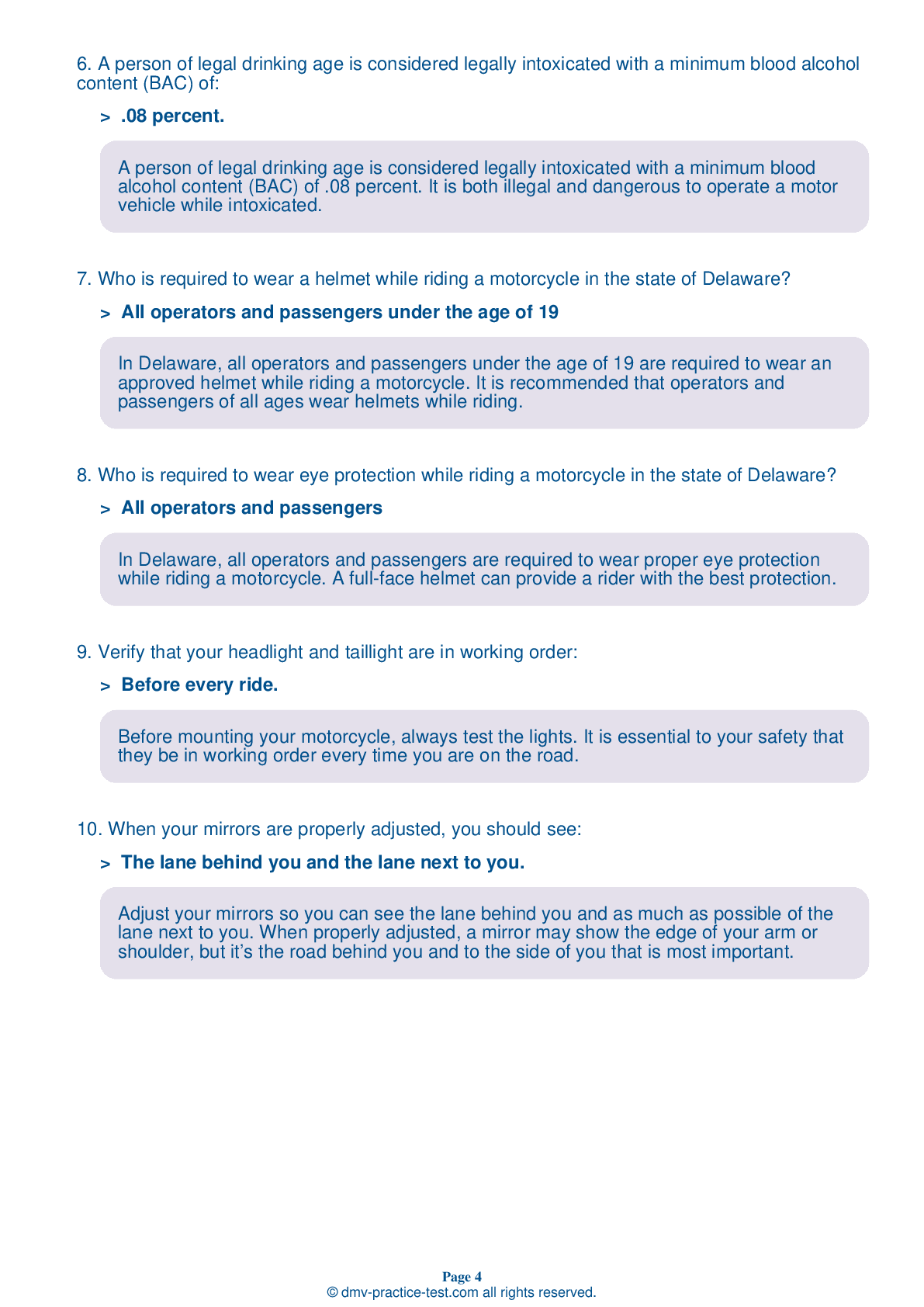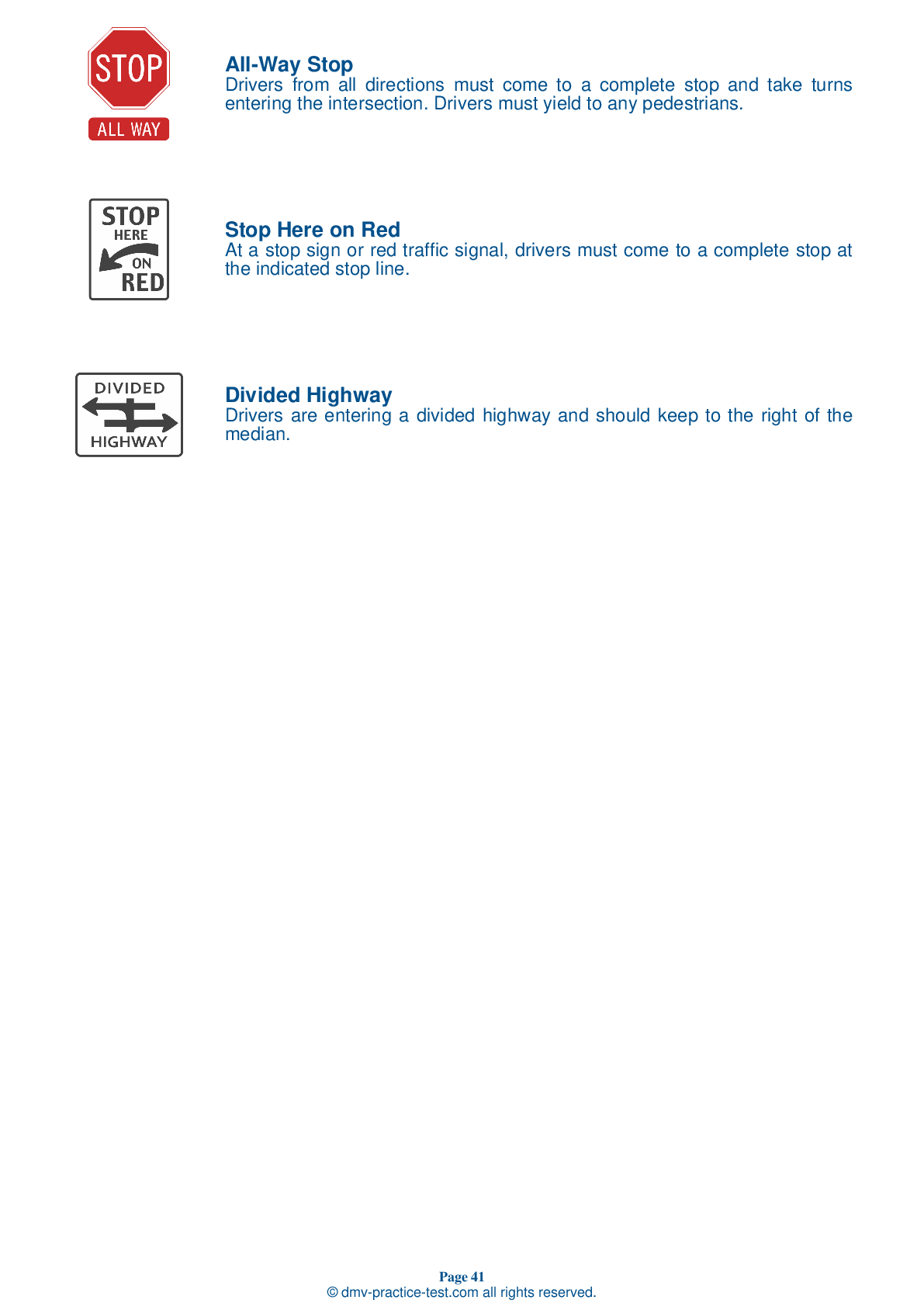DMV Permit Test #8
Motorcycle Test | License DE 2026 | FREE Online Practice! #8
Take this FREE motorcycle test (license in DE 2026) to check your knowledge of the road rules. To improve your results, download a motorcycle handbook online, study theory, and practice for free on our website. Still worried about how to get a motorcycle license in Delaware in 2026? Check our website for more sample tests, train as much as possible, and boost your grades!
25
20
16
1 . If the front wheel locks, you should:
If you lock the front wheel while braking, release the brake and immediately re-apply it.
2 . To steer a three-wheeled motorcycle, you should:
Three-wheeled motorcycles and two-wheeled motorcycles steer differently. Since three-wheeled vehicles cannot lean, the front wheel needs to be pointed in the direction you want the vehicle to go.
3 . When entering a turn, it is best to:
It is best to change gears before entering a turn. If you must change gears while in a turn, be sure to do so smoothly.
4 . To control a motorcycle well, a rider should:
When riding, you should be positioned so that you are able to easily operate all controls. Sit with your arms slightly bent and use your arms to steer rather than to hold yourself up. Keep your knees against the gas tank to help maintain your balance during turns.
5 . This sign means:
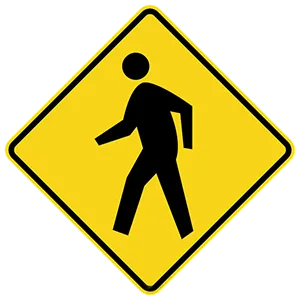
Warning signs are usually yellow with black markings. This sign alerts drivers to where pedestrians may be crossing. If a pedestrian is crossing in a crosswalk marked with this sign, drivers must stop and remain stopped until the pedestrian is no longer in the crosswalk.
6 . If your front wheel locks while you are braking, you should:
If the front wheel locks up while you are braking, release the pressure from the front brake. Immediately re-apply pressure to the brake with controlled gradual pressure.
2026 Delaware | Frequently Asked Questions
To acquire a motorcycle driver's license in Delaware, you need to apply for a motorcycle endorsement on your regular license. This involves passing a written test and a road skills test. Alternatively, you can complete a motorcycle rider education course, which includes both the written and skills tests. You must be at least 18 years old to apply.
In Delaware, the minimum age for obtaining a motorcycle driver's license, also known as a motorcycle endorsement, is 16 years old. However, if you're under 18, you must first have a graduated driver license (GDL) and complete a state-approved motorcycle rider education course before you can apply for the motorcycle endorsement.
Yes, you do need a dedicated license to ride a motorcycle in Delaware. This is typically referred to as a motorcycle endorsement and it can be added to your regular driver's license. You will need to pass both a written exam and a road skills test to get this endorsement, unless you successfully complete a certified Motorcycle Rider Education Program.
To apply for a motorcycle driver's license in Delaware, you'll need the following documents: proof of identity (like a birth certificate or passport), proof of Social Security number, two proofs of Delaware residency, and proof of legal presence in the U.S. If you're under 18, you'll also need a completed parental consent form.
Yes, you will need to take a written exam for a motorcycle license in Delaware. However, this requirement can be waived if you successfully complete a certified Motorcycle Rider Education Program. If you choose not to take the course, you'll need to pass the written test to demonstrate your knowledge of motorcycle operation and safety rules.
The Delaware motorcycle written test covers various topics including motorcycle operation and handling, traffic rules and regulations, riding strategy, dealing with emergencies, and sharing the road safely with other vehicles. The test is designed to assess your understanding of safe and effective motorcycle riding.
In Delaware, successfully completing a certified Motorcycle Rider Education Program (MREP) can waive the written and road tests for your motorcycle endorsement. However, you must still apply at the DMV, present your completion card from the MREP, and pay the required fees to get your motorcycle endorsement added to your driver's license.
To enroll in a motorcycle training course in Delaware, you first need to select a state-approved program. Then, you can register online or by phone. Courses typically require payment at the time of registration. You'll need to bring your own gear (helmet, gloves, etc.) and in some cases, your own motorcycle. Course completion can help waive the on-road test for licensing.
No, it's not mandatory to own a motorcycle for the license test in Delaware. You can use any motorcycle that is insured, registered, and meets safety requirements. However, you must have a valid motorcycle permit and be accompanied by a licensed motorcycle operator aged 21 or older to the test site.
Yes, you can use a friend's motorcycle for the driver's license evaluation in Delaware, as long as it is properly insured, registered, and meets all safety requirements. However, you must also have a valid motorcycle permit and must be accompanied by a licensed motorcycle operator aged 21 or older while driving to and from the test.
Yes, the Delaware motorcycle driving exam tests specific handling skills including starting and stopping, turning and swerving, and quick stops. You'll also be tested on your ability to balance at slow speeds. The exam aims to ensure you can safely operate a motorcycle on public roads. It's recommended you practice these skills before taking the test.
Yes, Delaware imposes restrictions on new motorcycle drivers under the Graduated Driver License (GDL) program. This includes a curfew preventing unsupervised riding between 10 pm and 6 am. Additionally, for the first six months, new riders cannot carry passengers. These restrictions are designed to ensure new riders gain experience safely.
Yes, your Delaware motorcycle license or endorsement allows you to legally operate a motorcycle in other states. However, it's important to note that when you are riding in another state, you must adhere to that state's specific traffic laws and regulations, which may differ from those in Delaware.
Yes, in Delaware, it is mandatory for all motorcycle operators and passengers to wear a helmet that meets the safety standards set by the U.S. Department of Transportation. This law applies regardless of the rider's age, experience level, or whether they're driving or riding as a passenger on the motorcycle.
In Delaware, there are two types of motorcycle licenses: a full motorcycle license and a motorcycle endorsement. A full motorcycle license is for those who only want to operate motorcycles, while a motorcycle endorsement is added to an existing car license, allowing the holder to operate both cars and motorcycles.
Yes, you can add supplementary endorsements to your motorcycle license in Delaware. For example, you can add a "3" endorsement if you want to operate a three-wheeled motorcycle. However, additional tests may be required, and the process can vary depending on the specific endorsement. It's best to contact your local DMV for more information.
Yes, the motorcycle license test in Delaware can be taken in a variety of languages other than English. These include Spanish, French, Russian, Vietnamese, and more. However, it's recommended to check with your local DMV office beforehand to ensure your preferred language is available.
A good strategy to prepare for the motorcycle license test in Delaware is to study the Delaware Motorcycle Operator Manual thoroughly. This manual covers all the information that you'll be tested on. Additionally, taking practice tests online can help you become familiar with the format of the test and identify areas where you need more study.
Yes, the motorcycle written exam in Delaware can be taken in several languages other than English. These include Spanish, French, Russian, Vietnamese, and others. However, it's advisable to contact your local DMV office in advance to confirm the availability of the test in your preferred language.
If you don't pass the motorcycle written test in Delaware, you are allowed to retake the test. However, you must wait at least 10 days before your next attempt. It's recommended to review the motorcycle operator manual and possibly take a motorcycle safety course before retaking the test to increase your chances of passing.
